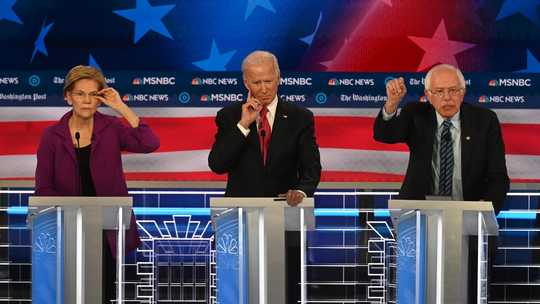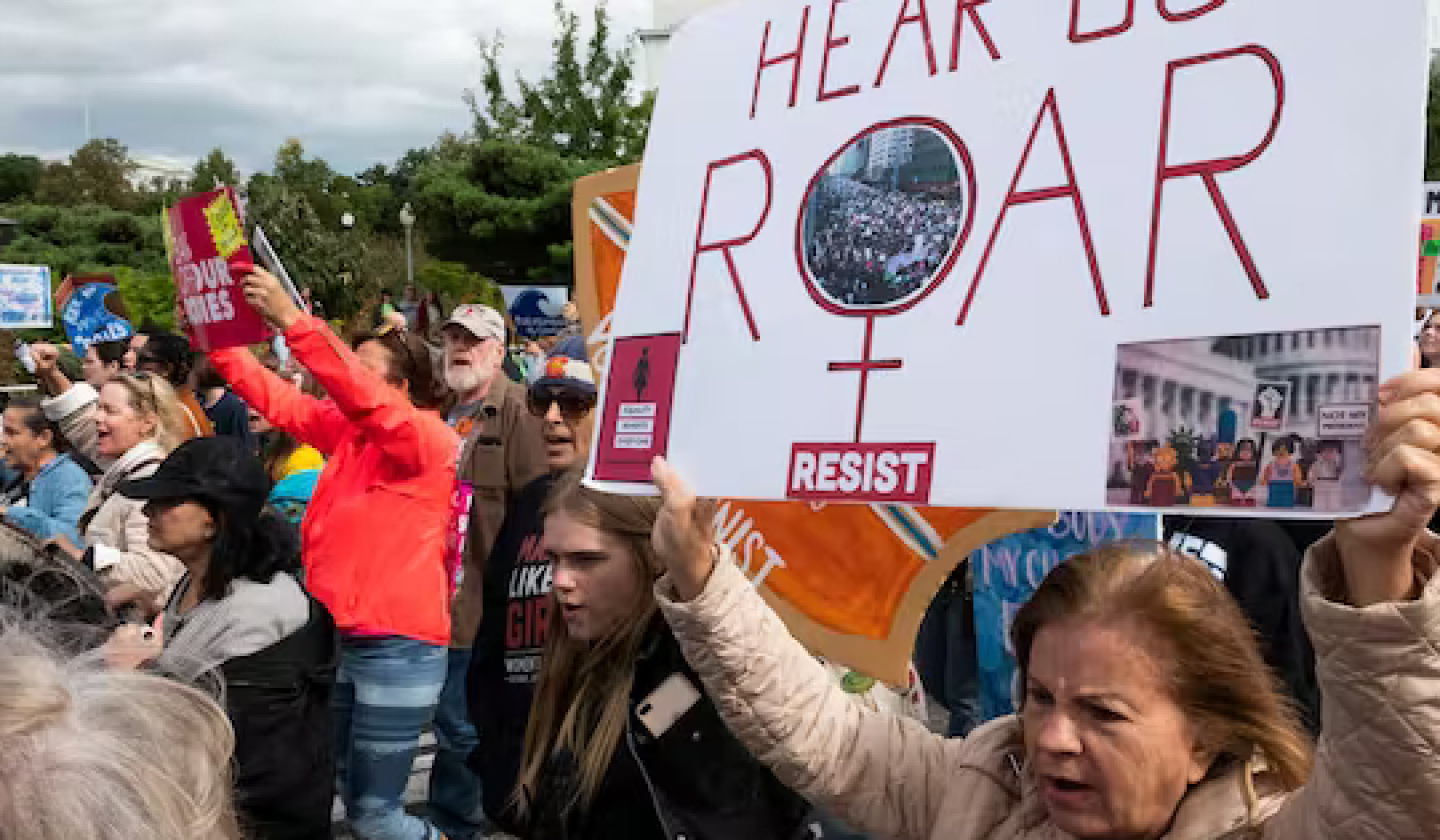
Make no mistake, how we pay for healthcare in the US is broken for many individuals and for many communities. Like a tire with a slow leak, without immediate repair the outlook for the largest industry in the US economy is bleak. However, fixing it is not that difficult and not at all that expensive. In fact, rehabilitating healthcare can free up money for other needs such as infrastructure and energy modernization.
A Pew study published [in October 2018] found that 6 in 10 Americans say that it is the federal government’s responsibility to guarantee health care coverage for all Americans. Yet the debate over the approach needed to provide coverage has been roiling U.S. politics for years, and that debate will play a prominent role in that country’s 2020 elections. - US News And Reports
As it is with most things in the US today, the problem is overcoming the vested interests that control the government against the will of the people.
How Much Are We Spending?
The US spends near $11,000 per person on healthcare. Yep, the US is #1 by a lot. These costs are borne by a patchwork system of out of pocket, government-owned, public and private insurance. Meanwhile, the rest of the world pays considerably less for better results.
2018 healthcare spending in Canada was less than $5,000 USD per person and everybody was covered without billing hassle. So. that makes it less than half of US spending at $10,000+
US Healthcare is Far Superior and Worth Every Penny?
Maybe there was a time when it was true that US healthcare was superior, and worth every penny, but it just doesn't hold up today when comparing to other OECD countries. In nearly all measurements of healthcare in a society, the US fails to be #1 and often the results are dismal.
Life Expectancy At Birth
Life expectancy at birth is one of the most frequently-used health status indicators. Gains in life expectancy at birth can be attributed to a number of factors, including rising living standards, improved lifestyle and better education, as well as greater access to quality health services. This indicator is presented as a total and per gender and is measured in years.
The US doesn't even get a nod when it comes to the top 10 healthcare systems per US News and Report 2019 Best Countries Report.
1. Finland
2. Norway
3. Sweden
4. Switzerland
5. Canada
6. Denmark
7. Germany
8. Netherlands
9. Australia
10. United Kingdom
Other Countries Pay Much More In Taxes?
Let's Look At Canada
I have a bit of experience with Canada as I live in Nova Scotia about 5 months of the year. And most of my friends in Canada are horrified at what is going on in the US.
Canada's tax burden is only 5% higher than the US: 32% vs 27% and the OECD average is 34%.
Among OECD countries, Mexico had the lowest tax burden, 16.2 per cent of GDP, while France had the highest, 46.2 per cent. In the United States, it was 27.1 per cent of GDP.
The comparison with the US at 27% confirms what I have been saying. Throw in the Canadian healthcare system and the US and Canada have a similar tax burden. However, a large part of the US tax spending is going to big business "welfare" and not "people's welfare".
I suspect the health outcome of Canada is equal or better than the US, so the healthcare deniers argument that healthcare in Canada is inferior and Canadians are taxed much higher is just BS as usual. Those deniers sure know how to lie.
The comparison in the video below between Canada and the US healthcare systems is good but keep in mind that they fail to point out that all Canadians are covered while as many as 25% of Americans are not covered at all or are seriously under-insured so that personal bankruptcy is the only way out.
Most bankruptcies in the US are caused by medical bills while in Canada that is unheard of. I think Canada governance is remarkable given its small population and huge geographical size -- what I would call fighting above its weight class. However, spending another $1,000-2000 per person would do wonders for the Canadian system.
{vembed Y=heK471H-s1s}
So How Do We Fix This Mess?
Franklin Roosevelt first entertained the idea of universal coverage and so did his vice president Harry Truman once he became President. Lyndon Johnson had some success in 1965 by passing Medicare for oldsters. Interesting that the name Medicare came from a health care legislation for military dependents and passed by Dwight Eisenhower, the last Republican president of substance for the people.
In 1964 Medicare was to be a blueprint for a universal single payer system. Guess which party blocked that?
The Clintons made another stab at healthcare in 1993. Blocked by guess who. Finally in 2008 Democrats had control of the house and filibuster-proof Senate.
Enter The Affordable Care Act. But Obamacare's public option was blocked not by Republicans this time but rather by a Republican in Democrat clothes, Joe Lieberman the now retired Senator from Connecticut and VP running mate of Al Gore. Perhaps the Republican nickname, Joe Loserman, was appropriate after all for those that lost their health because of him.
I drive by a major US based healthcare building in Hartford, Connecticut, home state of Joe Lieberman, twice a year every year and the building protrudes into the skyline surrounded by smaller buildings left and right. It does give the feeling we are being given the "finger" by the political system.
Obamacare did manage to insure about 20 million who didn't have coverage and that is progress. However, in comparison to most "developed" countries Obamacare coverage is mediocre at best.
If you are waiting for Republicans to fix the healthcare mess, don't hold your breath. Republicans are the ones to blame directly for this black hole stripping many an American of their hard-earned wealth, by lying, cheating, and stealing, merely because they can. This ill-gotten loot is transferred to insurance companies, drug companies and medical conglomerates that lobby and support the Republicans as well as a few Democratic members of Congress with Supreme Court legalized bribery.
So here we are approaching the 2020 election, and most Democrats are once again trying to come to the people's rescue. But can they agree enough to drag the many Americans determined to vote against their own best interest into the civilized world?
So what's cheapest? Single-payer.
What's best? Probably a mixture of government-provided and private-provided health care funded by the government.
How do we pay for it? That's the easy part. We simply pay for it exactly the way we do now, with a mixture of government, private, and corporate contributions that are already being paid to somebody. Ultimately that's not good enough as costs are skyrocketing, but the people's government can work on that because certainly the "for profit" US healthcare system has no incentive to lower costs.
How do we implement it? Set a time period so people and industries have time to adjust, Also remove any possibility of cancellation of the program by new government administrations. Give businesses and the people choice between government and private. And let government and private insurance compete head up.
Is it too expensive? It will cost $30 Trillion or $40 Trillion or maybe even $45 Trillion "they" say. What they don't usually say is that this amount is spread over 10 years. They don't tell you that because they are trying to shock and fool you.
Well, the truth is that the US spends $3.6 Trillion for healthcare each year. Over ten years that's $36 trillion. That's what it is costing taxpayers now. So a cost of of a "medicare for all" at $30 Trillion, for that same 10 years, would be a big savings.
If we take the current inflation rate of 2% for the next 10 years, the bill would come to $40 Trillion. If we take the government's estimated inflation rate for just healthcare, then the cost would be $45 Trillion. Big numbers! Yep! But bottom line, either these politicians are lying to you that we can't pay for decent healthcare or they are flat-out ignorant. However, I suspect they are lazy, maybe, but certainly not ignorant because these numbers are out in the open for anybody to see who can google or duck duck go.
But it doesn't have to be medicare for all. And it probably won't be regardless of who is elected come November.
So What Does The Future Hold?
The cost of healthcare is rising much faster than wages. Already most people cannot pay for most healthcare out of pocket and private insurance is coming up with even more inventive ways to renege on their promises. Employers are dropping coverage or at best shifting more costs to their employees and their families. As for the government, Republicans and some "moderate" Democrats are intent on denying the possibility of a healthy America. Most of us only have one choice. Cut through the BS and vote the political naysayers down the river.
Make no mistake their so called "for profit - free market" healthcare system in the US is broken and it's coming for your health (and your dollars) sooner rather than later if changes are not made....soon.
So much for how to pay for healthcare. What we should be concentrating on is how to properly administer good health for all people. And that requires a system whose incentive is to keep people healthy not just treat their illness. And that is where the US system fails and why costs are skyrocketing.
What we are left with is expensive massive multiple government and private administrative bureaucracies. And a partial private system where 10% of participants are stealing the public blind. In just a tip of that iceberg is a sitting US Senator that is personally responsible for the theft of over $2 billion from Medicare as CEO of a health care company.
Donald Trump said he was going to fix healthcare. He hasn't. He hasn't even tried. In fact he is trying to strip some of what they already do have. But shall we give him the benefit of the doubt which he so richly doesn't deserve, for he did say "Who knew healthcare was so hard." Well it's not hard. In fact it's exactly how one half of the Congress wants it to be. And it is that half that is blocking it from being the very best it can be for all.
About the Author
 Robert Jennings is co-publisher of InnerSelf.com with his wife Marie T Russell. He attended the University of Florida, Southern Technical Institute, and the University of Central Florida with studies in real estate, urban development, finance, architectural engineering, and elementary education. He was a member of the US Marine Corps and The US Army having commanded a field artillery battery in Germany. He worked in real estate finance, construction and development for 25 years before starting InnerSelf.com in 1996.
Robert Jennings is co-publisher of InnerSelf.com with his wife Marie T Russell. He attended the University of Florida, Southern Technical Institute, and the University of Central Florida with studies in real estate, urban development, finance, architectural engineering, and elementary education. He was a member of the US Marine Corps and The US Army having commanded a field artillery battery in Germany. He worked in real estate finance, construction and development for 25 years before starting InnerSelf.com in 1996.
InnerSelf is dedicated to sharing information that allows people to make educated and insightful choices in their personal life, for the good of the commons, and for the well-being of the planet. InnerSelf Magazine is in its 30+year of publication in either print (1984-1995) or online as InnerSelf.com. Please support our work.
Creative Commons 4.0
This article is licensed under a Creative Commons Attribution-Share Alike 4.0 License. Attribute the author Robert Jennings, InnerSelf.com. Link back to the article This article originally appeared on InnerSelf.com
Remember Your Future
on the 3rd of November
Learn about the issues and what's at stake in the November 3, 2020 US Presidential election.
Too soon? Don't bet on it. Forces are conniving to stop you from having a say in your future.
This is the big one and this election may be for ALL the marbles. Turn away at your peril.
Only You Can Prevent 'Future' Theft
Follow InnerSelf.com's
"Remember Your Future" coverage
Related Books:
The Body Keeps the Score: Brain Mind and Body in the Healing of Trauma
by Bessel van der Kolk
This book explores the connections between trauma and physical and mental health, offering insights and strategies for healing and recovery.
Click for more info or to order
Breath: The New Science of a Lost Art
by James Nestor
This book explores the science and practice of breathing, offering insights and techniques for improving physical and mental health.
Click for more info or to order
The Plant Paradox: The Hidden Dangers in "Healthy" Foods That Cause Disease and Weight Gain
by Steven R. Gundry
This book explores the links between diet, health, and disease, offering insights and strategies for improving overall health and wellness.
Click for more info or to order
The Immunity Code: The New Paradigm for Real Health and Radical Anti-Aging
by Joel Greene
This book offers a new perspective on health and immunity, drawing on principles of epigenetics and offering insights and strategies for optimizing health and aging.
Click for more info or to order
The Complete Guide to Fasting: Heal Your Body Through Intermittent, Alternate-Day, and Extended Fasting
by Dr. Jason Fung and Jimmy Moore
This book explores the science and practice of fasting offering insights and strategies for improving overall health and wellness.
care






























